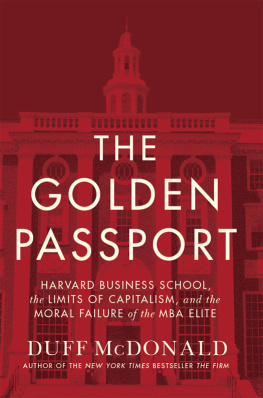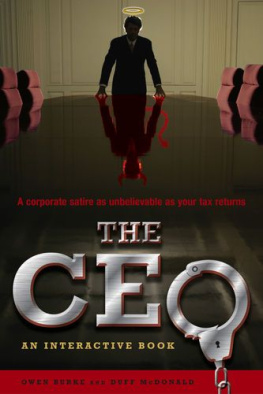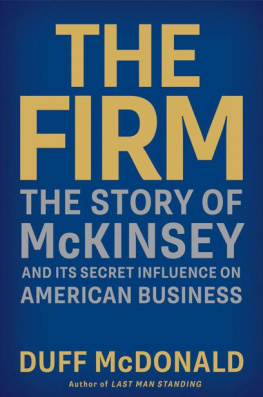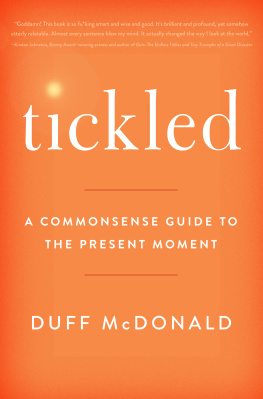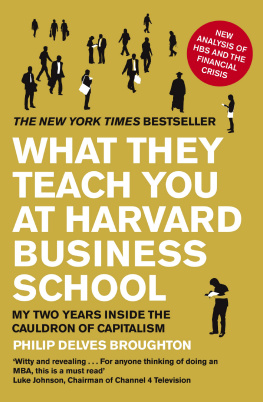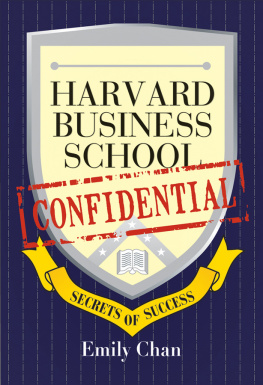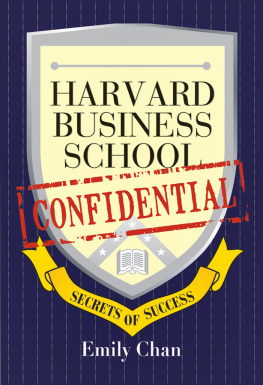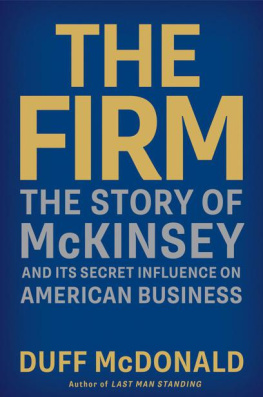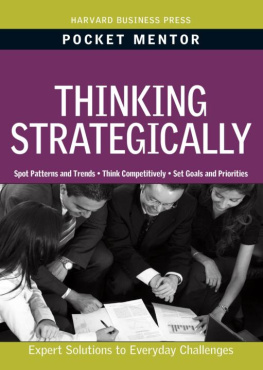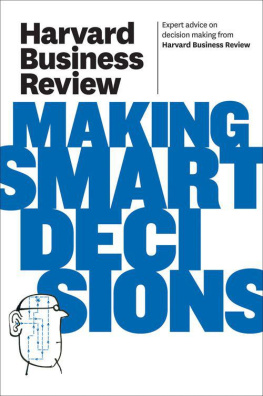C asey Gerald stood at the podium during Harvard Business Schools 2014 Class Day and gave what one commentator later referred to as the most stirring speech ever by an MBA. Gerald, the student speaker for his graduating class, recalled how hed come to the worlds best-known business school in Boston, Massachusetts, with the simple goal of getting his MBA and using it the way the New York Times described it in 1978: as a golden passport to the good life. But here he was, on the cusp of graduation, and hed concluded that the good life could wait. Unlike so many of his peers, Gerald wasnt taking a job at a private equity firm for $175,000 a year. Instead, he and three classmates were launching a nonprofit startup called MBAs Across America, with the aim of putting energetic and idealistic MBAs such as themselves together with mission-driven businesses across the United States.
His final words were a rousing ratification of HBSs claim to educate leaders who make a difference in the world. An impassioned Gerald beseeched his classmates, In your hands, as well as mine, lies the hope for a new generation of business leaders in which each of us becomes a pioneer, in which each of us decides to travel unknown roads in search of unsolved challenges, in which each of us commits our time and talent not just to the treasures of today but to the frontier of tomorrow, where new dreams and new hopes and new possibilities are waiting for us to pull them from the darkness. Yes, we have more work to do.... Hard work, frightening work, uncertain work, unending work, work that may test us, work that may defeat us... but work on which the whole world depends. The time is short and the odds are long, but I believe that we are ready nonetheless. With the love of those who raised us, with the lessons of those who taught us, with the strength of those who stand beside us as we face what lies ahead, I say, let us begin.
The eighteen-minute speech has been viewed more than 200,000 timescertifiably viral, at least as far as business school Class Day videos are concerned. It was also timely, at least as far as HBS was concerned. Long regarded with reverence and skepticism in equal measure, in 2014 the School was in need of a love poem like the one Gerald had just written to it. In the wake of the 2008 financial crisis, it had endured the latest of its periodic raking over the coals in the media, which had specifically accused it of grooming the kinds of behaviors that had brought the global economy to the brink. And suddenly here was Gerald, who had entered HBS with an eye on his own wants but had emerged with an eye on others needs. He is a handsome man reeking of leadership qualities, and his face quickly found its way onto both the cover of Fast Company magazine and HBS fundraising posters. He became a poster boyliterallyfor the idea that capitalism really can be a force for good.
Products like Casey Gerald (it is a business school, after all) allow Harvard Business School to claim with a straight face that it is developing leaders who will make a difference in the world. It can look its naysayers in the eye and say that it isnt just about the money. It can trumpet its dedication to diversity, too. Geralds ambitions were made even more remarkableand marketable by HBSgiven his personal narrative: an African-American who was raised by his grandmother in the down-at-its-heels Dallas neighborhood of Oak Cliff. (Sure, he had arrived at HBS via Yale, but the point still standshe isnt the typical Harvard MBA, at least not the type that exists in the public imagination.) And it can assert that it is delivering on a self-imposed mandate that it has doggedly reiterated over the years, one that was expressed by its dean in the early 1930s as follows: In training a student for [a career] in business, this School has aimed to stress in all its work the responsibility of business to the community as a whole.
Less publicly, it can also take pride in the fact that Casey Geralds speech was convincing. Because thats another thing that Harvard Business School sells: a form of rhetoric. Watch the speech and youll find it hard not to root for Gerald. You might even be ready to believe that the place does impart more than just the secret password to the club of the chosenthings like values and a social conscience. Its not really up for debate whether HBS grads are highly likely to end up both comically wealthy and immensely powerful. But the example of Casey Gerald can be put forth as living proof that they really do intend to use that power for the good of us all.
And yet.
And yet, talk to Casey Gerald a few years later, and hell tell you that if thats the message you took away from his speech, then you are mistaken. Yes, he says, there are many people at HBS, both students and faculty, who truly put the interests of others ahead ofor at least on par withtheir own, but theyre still a distinct minority at the school.
If all you do at HBS for two years is spend two hours on every case and try to answer the discussion questionstaking an off-the-rack approachits not going to change your life, he tells me over a coffee in Brooklyn in early 2015. For a whole semester, for example, the school is basically bought and paid for by the consulting firms. You cant go to lunch without seeing someone from Bain, Boston Consulting Group, or McKinsey. Its not a bad thing to work in consulting or finance, but its a terrible thing to tell eighteen hundred people who are purportedly the brightest minds of their generation that they only have two careers to choose from. In fact, its unconscionably unimaginative.
I ask him whether hes concerned about accusations of heresy, whether hes at risk of being run out of the vaunted HBS networkthe more than 76,000 living alumni in 167 countries around the world, quite likely the most powerful and active alumni organization that has ever existed. Were meeting in Brooklyn, after all, because MBAs Across America is working out of the nearby offices of Tough Mudder, which was founded by fellow HBS alumni. Not in the slightest. Its like what James Baldwin said about America, says Gerald. He said, I love America more than any other country in this world, and, exactly for this reason, I insist on the right to criticize her perpetually. I feel the very same way about Harvard Business School.
What I think HBS does, and does very well, says Gerald, is train people to, in situations of ambiguity, to take imperfect information, uncertain outcomes, and tight deadlines and figure out what to do in the most effective, efficient, and powerful way. But the tragedy of the Business School is that you can use that ability to do two things at once, to build great companies and destroy the planet in the process. Or its people. Robert S. McNamara was an HBS alum. He helped turn around Ford Motor Company, and then went on to wreak destruction in Vietnam. We have to have a conversation about which one were doingand why we should be doing one and not the other. Theres nothing ambiguous about it.

Debates like this, Gerald points out, dont happen that often at Harvard Business School, even if they do raise, and ought to raise, fundamental questions about what institutions like HBS are actually good for and good at. An example: Should the role of a professional school extend to taking responsibility for its graduates spiritual life? On the one hand, their incoming students are adults when they arrive. On the other, if they came in fully made, they wouldnt need to pay $250,000 for a two-year education. They are, by nature, risk-averse. And they need guidance. In a way, its therapy, says Gerald. You dont bring people into therapy and then tell them to figure it out on their own.

